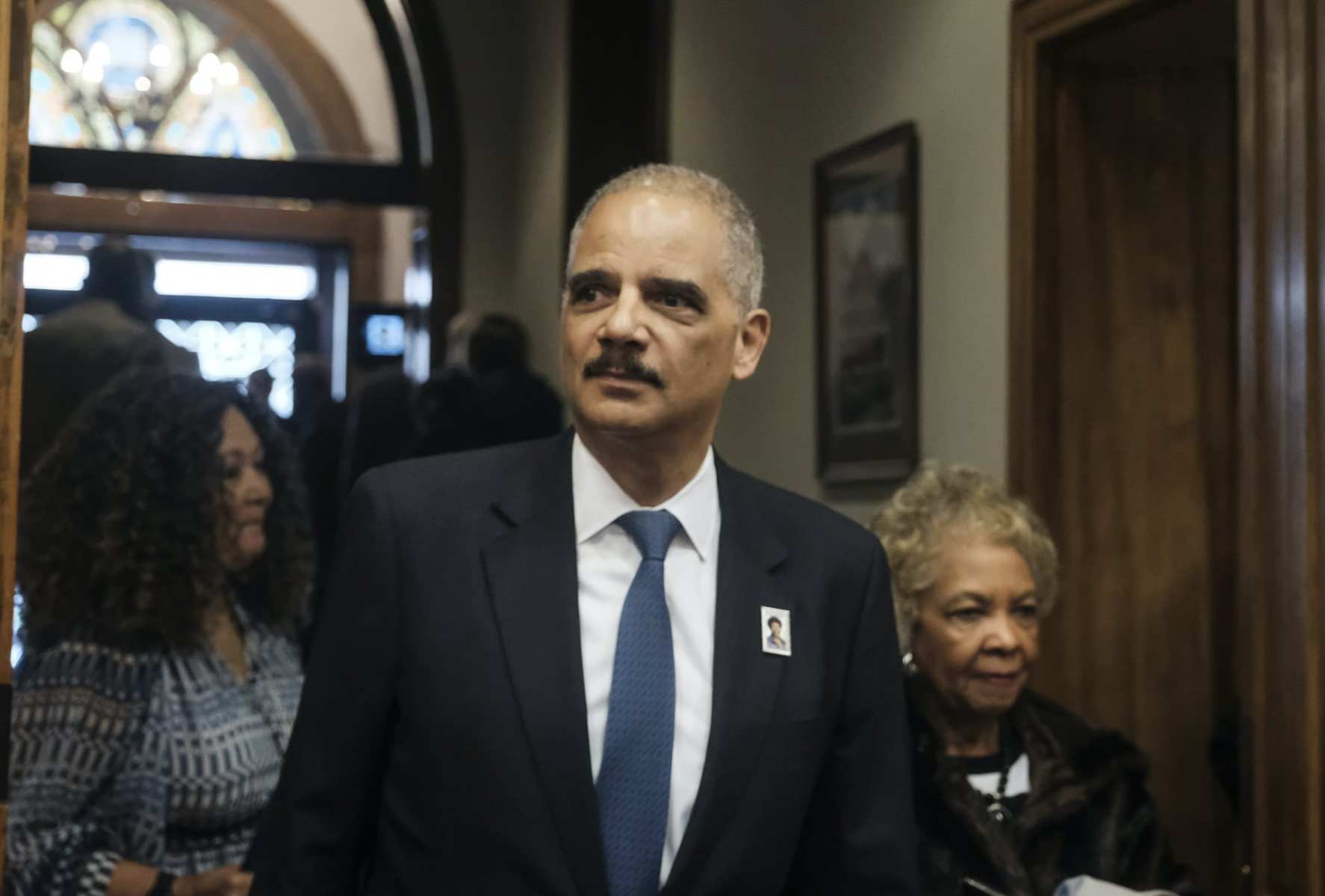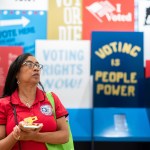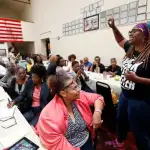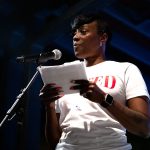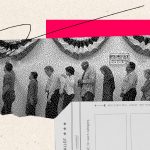With just over a week to go until the 2020 general election, The 19th spoke with former Attorney General Eric Holder, now chairman of the National Democratic Redistricting Committee, in a wide-ranging interview about the gender impact of voter suppression, redistricting and the Census.
The country’s first Black attorney general also weighed in on criminal justice reform and the Breonna Taylor case, as well as why being a First matters in Black political leadership.
Below is an edited version of the conversation.
The 19th: We’ve written a lot this year about the reality that racism is on the ballot for Black voters. And we know that the majority of those voters are Black women. So let me start by asking, what do you see as the stakes of this election for them on issues including criminal justice reform, voting rights and ballot access, and the range of specific and qualities that have been exposed by this pandemic?
Eric Holder: I’d say that more than any particular issue, what’s at stake in this election is our democracy itself. But if we look at the disparities that have been exposed over the course of this year, I think we’ve got to talk about the impact of the pandemic. The economic downturn, the systemic racism that has been exposed in any number of areas, not the least of which is the criminal justice system. The disproportionate impact, that doesn’t get enough attention, of the climate crisis. There are environmental justice issues that have arisen.
This is the most consequential presidential election of my lifetime. And, so you know, I was born when Harry Truman was president! I think this is of that magnitude because this is really a decision that the American people have to make about what the direction of the country is going to be.
The 19th: More than 50 million Americans have already voted in an election, which is, I think, a sign of enthusiasm. But it is also a sign of voter suppression. Should we be characterizing those Black and brown voters as “heroic” when they’re actually being forced to stand in line for hours to counteract suppression?
Holder: It’s great that we have high levels of enthusiasm, and there’s no question that that is there. But this is not just about voter enthusiasm. Look at Georgia and Texas, two states that have a history of voter suppression. Look at the lines that we’re seeing there, and there’s no good reason for it … other than that you’re trying to keep the vote totals low.
You’re trying to discriminate against Democrats, then most specifically, you want to make sure that people of color don’t have access to the polls. Georgia has not improved their voting processes much after that travesty of an election back in 2018 that I’m still convinced that Stacey Abrams won.
This is really part of a larger project by the Republicans to entrench themselves into power illegitimately gained and illegitimately maintained. It’s about gerrymandering, photo ID laws, poll closures since the Shelby County case, purging voter rolls, weaponizing the Census. I mean, they’re doing a whole range of things to try to keep themselves in power.
The numbers speak for themselves, and they are unapologetic. They are brazen in their desire to keep people away from the polls. They’re afraid of the very people who they say they ultimately want to represent.
The 19th: We know voter suppression is not just an issue from a racial standpoint, but also in terms of gender, because again, Black women are the majority of Black voters and could be among the most disenfranchised, even if they are among the most galvanized Americans. Can you talk about the specific threat to them, in terms of their numbers?
Holder: The most reliable voters, as a group, are African American women. And so, if you look at all of the things that are being done to suppress the African American vote, the Democratic vote, the people who suffer the most under these suppression tactics are African American women.
There is a gender issue here because when you look at the ways in which Republicans are holding on to what, in essence, is minority support and holding on to majority power, you know there’s that disconnect. But they don’t want to suffer any electoral consequence for that. And so they do all the things that we just talked about … they’re trying to keep Black women away from the polls.
[Republicans] get that Black women are an extremely potent political force.
Eric Holder
They get that Black women are an extremely potent political force. And if you want to neuter the Democratic Party, you have to keep Black women away from the polls. Black women vote in huge numbers and then also vote in substantial numbers for Democratic and progressive candidates, which is totally inconsistent with the political desires and the political needs of illegitimately entrenched Republicans.
The 19th: I want to talk about another area of focus for you, the statehouses that are in play this cycle and the implications of some of these state legislatures that could flip. Black women have been on the front lines pushing back against suppression. Are they also in the fight over redistricting? Should they also be concerned about gerrymandering? Why?
Holder: I get it that everybody is focused on the presidential election, but people can’t forget those down-ballot races. I actually hate the term “down-ballot” because it makes it seem like they’re not as important. But the reality is that on a day-to-day basis, your life is more impacted by who serves in your state legislature than by who the president of the United States is.
And that’s why I’ve been trying to work, to get people to focus on those down-ballot races. Angela Lang [the founder of BLOCK, or Black Leaders Organizing for Communities in Milwaukee] has been a great partner of ours in our attempts to democratize Wisconsin. Angela Lang and BLOCK are going to be a huge factor in the presidential election, by getting African Americans and people in Milwaukee to the polls in ways that they did not go to the polls in 2016. It’s much more likely that Joe Biden wins the presidency because he’s gonna carry Wisconsin in 2020.
Black women are out there. Angela is a great example of a community-based organization led by an African American woman that has a huge impact not only in her neighborhood, but in her state and also in this nation.
The 19th: As someone who was serving as Attorney General and beginning to work on reforms during the emerging Black Lives Matter movement, I want to ask you about the Breonna Taylor case and what criminal justice reform could look like going forward, depending on the outcome of this election. This was a case where Black women and their civil rights were highlighted as an issue.
Holder: In the wake of this, people are not really understanding the impact to Black women around police violence and the need for police reform. There is a focus on the way in which Black men have been treated by the criminal justice system, the nature of their interactions with police officers on the street. And that’s understandable.
But we are missing an awful lot when we don’t focus on what’s happening to African American women under similar circumstances. There are a host of African American women whose names are not as well known to us as their Black, male counterparts. And that’s something that I think requires a refocus, certainly by us in the African American community, but the larger society as well.
People are not really understanding the impact to Black women around police violence.
Eric Holder
You can’t just think that if you want to talk about criminal justice reform and better interactions between law enforcement and communities of color that this is just a male thing. There’s an awful lot that’s going on there with Black women as well. There are these headline-making cases, but that’s Black women are disrespected, mistreated — that doesn’t necessarily involve a loss of life or even something that’s violent.
And yet we know from our history and we know from the stories that are still shared, that Black women are treated less fairly, get less respect in their interactions with people in law enforcement than their White female counterparts. And that is something that we as a society have to come to grips with.
The 19th: I want to ask you about something else that I know that you are concerned about: the Census. With women being the majority of the U.S. population in the electorate, how concerned are you about the gender impact of a potential undercount, and what’s it going to mean for resources for women and for other marginalized groups over the next decade and the gender impact for redistricting that could come as a result of the Census?
Holder: The Trump administration has tried every way they possibly can to weaponize the Census, and people need to understand this is not normal. I might have disagreed with the Bush administration violently on a whole range of issues, and yet they did a good job preparing the Census so that when we came into office, the Census was pretty much ready for us. The Census has been pretty much nonpartisan. The extent to which they’re trying to weaponize the Census now is really kind of unheard of and, I think, pretty shameful.
And then when you look at what the impact of that is likely to be when you don’t have a good count, that means that communities of color are not likely to get adequate political representation. And that is critical. But there’s another component to this, and that is that there’s about a trillion dollars in federal aid that goes to the states for the kind of programs that are going to matter to women and that are funded by the federal government. Those programs are going to be negatively impacted by an undercount.
And if the undercount is going to be in communities of color, that means that African American women and Hispanic women are most likely to be the ones most adversely affected. It deals with a whole range of issues, from feeding programs, the ways in which you measure aid to families.
African American women being as political as they are, if you’re going to discriminate, if you’re gonna undercount and then you’re going to reapportion on the basis of that undercount, the group that is going to be most adversely affected is the group that is most politically involved, and that is African American women. That’s the height of unfair. You’re going to do what is the most civically responsible thing, but we’re gonna have an undercount, and then we’re gonna punish you and not give you the representation that you deserve.
The 19th: As the first African American to hold the position of U. S. Attorney General, I know that you know that it’s not enough to have a First unless there’s a Second. What are your thoughts on the prospect of the first Black woman vice president, possibly the first Black woman Supreme Court Justice, and then maybe a second Black woman Attorney General? How do those kinds of lenses have the potential to change what can happen in terms of more fully and finally addressing systemic racism and equality in our country?
Holder: I think people come to these jobs, whether you’re a Supreme Court justice, an attorney general, a vice president, hopefully a president, you bring your lived experiences to the job. Your perspective on issues is shaped by the life experiences that you have had.
Let’s focus on Supreme Court justice. When those justices have to consider a case, an African American woman will bring to that conversation something that has never been heard in that room before. I obviously have great respect for Thurgood Marshall, who is one of my idols. I understand that Clarence Thomas has a unique Black perspective, but neither of them had the ability to bring to the fore and into those conversations what the lived experience was of a Black woman. There are lots of similarities, you know, with African American men, but boy, there are some significant differences. That will change the way in which the other justices will look at issues, and that will run a range of issues.
You can’t think of women monolithically. White women are going to have issues that they have to deal with, and they’re going to be similar to some of the issues that Black women have to deal with. But then there’s a subset of issues that women of color generally and African American women specifically must confront that their White sisters do not. And that is something that an African American woman as a justice, or as the vice president, or as an attorney general can bring to the decision-making that they have to do and then influence the decision-making of their counterparts.
Some of these folks are so ideological that they will decide the way they’re going to decide. But at a minimum, there, at least intellectually gonna have to deal with that unique perspective that an African American justice would bring to the conversation.
The 19th: There is a conversation happening right now, with just days left to go to the election, about the need to shore up Black men in this election and the idea that Black men may be open to voting for President Trump in a way that Black women are not, or may not necessarily be on board with Vice President Biden. What do you think that that’s about?
Holder: I think that’s, like, testosterone poisoning. There are certain men who are gonna look at a masculine fraud like Trump and identify with his machismo, his bravado — which is not backed up by anything — but will identify with him in that way. That cuts through, in some ways, the substance that my brothers ought to be focused on.
My guys need to do both their homework, and then need to check their testosterone at the door before they make the decision about who they want to support. I’d like to have a conversation with that 17 percent [of Black men who support the president, according to polls]. There are [certain people who] think that the moon landing was fake. There are going to be certain people that we’re just not going to be able to get to. But 17 percent … I get concerned that number is too high. It is alarmingly high.
From the Collection
